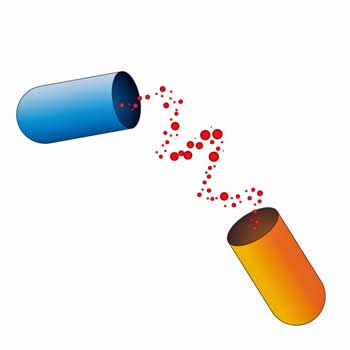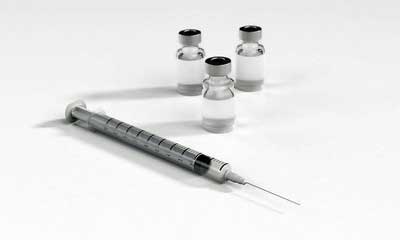

What do a vaccine, a cough suppressant, a drug with only numbers for a name, an anesthetic, and the new migraine drugs have in common? They’re all either being tested in an FM clinical trial or are about to be.
FM may not be getting a lot of research but it’s definitely getting interest from some drug manufacturers. Check out the FM drug trials that are currently recruiting or about to recruit patients, and see if you’re interested in being in a trial. With some large, country-wide trials under way, many people in the U.S. will probably have access to one.
Drugs, of course, are only one treatment option. Many more trials using brain stimulation, physical manipulation and other options are under way. A future blog is expected on those.
Tonix Gets Back in the Game
An updated form of Flexeril (cyclobenzaprine), Tonix’s TNX-102, looked like the second coming for awhile. The new sublingual format of the drug shot it straight into the body, reducing the dose needed, and most importantly, bypassing Flexeril’s fatal flaw – the build up of a toxic element. It looked like people with FM were going to get treated to a drug which reduced both sleep AND pain.
But then the phase III trial failed to meet its primary endpoint, sending the small drug company’s stock price plunging and wiping out millions in value. In truth, the drug hadn’t done all that badly. It significantly helped with sleep and overall symptom burden – but didn’t, unfortunately, meet its primary endpoint on pain. Its interest in FM apparently over, Tonix reported it would focus on PTSD.
But then Tonix took a second look, re-analysed their data, had a successful PTSD trial, and suddenly was back in the game. The proposed fix was startlingly simple: simply double the drug dose to that which was successfully used in the PTSD trial.
Apparently, they were able to convince their investors to give them one more shot, because three weeks ago, Tonix officially opened a major 39-site 14-week U.S. fibromyalgia trial. If you live near a big metropolitan center, there’s a good chance a trial is going on in your area. This phase III trial is the best shot FM patients have at a new FDA-approved drug in the near future.
People from 18-65 years of age with a diagnosis of FM, and a certain level of pain, can participate in the trial. Contact Mary Aloisio, 619-395-5767, mary.aloisio@tonixpharma.com, if you’re interested.
- Find out more about the trial here.
Getting Vaccinated Against Fibromyalgia Pain?
“Given what’s been published in the medical literature, we believe this vaccine will reverse the immune system abnormalities [of fibromyalgia].” Dr. Bruce Gillis, Epigenetics CEO
A vaccine to stop pain sounds like a pretty far-out idea but the Swedish doctor Carl Gottfries reported that he successfully used a staphyloccus vaccine in chronic fatigue syndrome (ME/CFS) for over 50 years. The BCG vaccine has been around even longer. Still the only vaccine used to fight tuberculosis, the BCG vaccine has been used for over 100 years. (It’s not used in the U.S. because of the low risk of tuberculosis.)
I was unable to find any studies published on the Bacillus Calmette-Guérin (BCG) vaccine in FM but the vaccine itself has gotten plenty of study. A 2017 review reported that the vaccine had shown good results in mice asthma, multiple sclerosis and insulin-dependent diabetes studies.
The Los Angeles-based biomedical firm EpicGenetics came upon the vaccine idea after discovering what they believe is the first blood test for FM – the FM/a test – which measures the levels of four chemokines and cytokines that two studies indicated were reduced in FM. (The FM/a blood test will be featured in a future blog).
Vaccines are primarily used to fight off pathogens but they also stimulate the immune system. The BCG vaccine just happens to stimulate the four chemokines and cytokines found reduced in FM – hence the trial.
The 300-person, randomized, triple-blinded, Phase II, Mass. General Hospital BCG vaccine trial started in January of this year and is expected to end up in January 2022. A call went out earlier this year for more men and younger female patients.
This is a phase II safety and efficacy trial. If the trial is successful, larger phase III trials will be needed to get FDA approval.
| Contact Denise L Faustman, MD, PhD | 617-726-4084 | fibromyalgiastudy@partners.org if you’re interested |
- Find out more about the trial here.
NYX-2925: The Central Sensitization Desensitizer? (say that three times in row:))
Aptinyx is a small drug company which, like Tonix, had troubles of its own. The company went public behind its $118 million IPO, then promptly saw its stock price get whacked when its featured product failed to meet its primary endpoint in diabetic neuropathy.
Aptinyx was whistling Dixie with the results of its FM trial, though. Both brain scans and clinical scores improved in the two-week trial of the NMDA modulator.
By significantly reducing levels of the excitatory neurotransmitter glutamate (glutamate/glutamine (Glx)) in the anterior cingulate and insula in the brain, this unique drug seemed to strike at the very heart of the central sensitization process occurring in FM. The drug also reduced the up-regulated pathways found between brain regions implicated in pain processing in FM.
Longtime FM advocate and researcher Daniel Clauw called the results “compelling” and stated that the drug appeared to be “addressing the type of centralized pain evident in patients with fibromyalgia.”
The company certainly thinks they’re onto something. Their 15-week, 300 person, randomized, double-blinded, placebo-controlled Phase II drug trial was due to begin this November and is slated to last until Feb. 2021. It will be assessing pain intensity, sleep, pain reduction, overall symptom reduction and cognition.
People with FM between the ages of 18 and 65, with a certain level of pain, and who meet other criteria are eligible to take part in the trial. Contact Sarah Torri at 847-871-0377 or clinicalstudies@aptinyx.com, if interested. The trial is taking place at 25 sites across the U.S.
- Find out more about the trial here.
The New Migraine Drugs Take Aim at Fibromyalgia
The new monoclonal antibody antibody drugs designed to put a hurt on calcitonin gene-related peptides (CGRP) are revolutionizing migraine treatment. With two anti-CGRP studies under way in fibromyalgia, we’ll see if they can do the same for FM.
There’s certainly reason to believe they may be able to. Migraine may be the most common disease associated with FM, and CGRP, a potent vasodilator, enhances the transmission of pain signals. These anti-CGRP drugs are used in migraine to reduce the activation of the trigeminal nerve in the head, neck, sinuses and jaw but CGRP is believed to regulate pain levels throughout the body.
Given the strong overlap between migraine and fibromyalgia, it’s no surprise that a couple of anti-CGRP drug makers have their sights set on FM. Check out one person with severe migraines and fibromyalgia describe how an anti-CGRP drug helped with both conditions.
The Teva Trial
Teva, the drug manufacturer, is going long in its Phase II FM fremanezumab trial. The 35-week, 240 person, randomized, double-blinded, placebo-controlled trial is taking place in 30 sites across the U.S.
Starting in May 2019, it’s expected to last until August 2021. Pain, quality of life, sleep, fatigue, overall health, physical functioning, and mood will be assessed.
Contact Teva U.S. Medical Information at 1-888-483-8279 or email them at USMedInfo@tevapharm.com, if you’re interested.
The Fibromyalgia and Small Fiber Neuropathy Trial
If you happen to have small fiber neuropathy and FM, you may be able to participate in the “Anti-CGRP for Inflammation and Pain Modulation in Small Fiber Neuropathy/Fibromyalgia” trial featuring Galcanezumab.
The trial is starting in December and ending June 2021. To find out about this 20-person North Carolina trial contact: Kelsey Ling, 919-684-2713, kelsey.ling@duke.edu
- Find out more here:
Suppressing Neuroinflammation (with a cough suppressant)
Jarred Younger is leaving no stone unturned in his efforts to knock down the neuroinflammation his work suggests is doing people with FM and ME/CFS in. Better known as a cough suppressant, dextromethorphan is an NMDA receptor agonist with quite a track record as a neuroprotector. It’s been shown to protect neurons from glutamate excitotoxicity, hypoxia and ischemia (all of which may be occurring in FM) and it inhibits microglial activation to boot.
Younger’s small, 15-person non-randomized dextromethorphan trial at the University of Alabama at Birmingham began in June of 2018, and is expected to end in June 2020.
The Canadian Ketamine Trial
Finally, if you’re in Toronto you might want to check an IV Lidocaine and Ketamine trial for neuropathic pain. Ketamine, an anesthetic with both pain and depression-reducing properties, is one of the most interesting compounds going. I know of one person with ME/CFS who was able to reduce his opioid drug intake markedly once he got on ketamine.
The 70-person “Ambulatory Infusions of Lidocaine and Ketamine for Management of Chronic Pain” trial is starting at the end of this year and ending at the end of next year.
Contact: Ramin Safakish, MD. FRCPC, 647-478-8462, Ramin.Safakish@AllevioClinic.com or Shadi Babazadeh, MD, 647-478-8462 ext. 90, shadi.Babazadeh@AllevioClinic.com
- Find out more here.
The NIH HEAL Initiative Begins
The NIH’s 945 million dollar Heal Initiative to combat the opioid epidemic and develop better pain drugs finally got underway with hundreds of awards given out last September. From brain stimulation to ion channel inhibitors to epigenetic modifications, many different treatment approaches are being assessed. Only one FM trial (assessing TENS units) is included but the initiative will hopefully tell us much about how chronic pain occurs and how to combat it. The NIH reportedly hopes 15 new ways to combat pain will come out of the initiative.
- Treatment Takeaway – Seven drugs are currently or are about to begin treatment trials in fibromyalgia. One drug trial currently recruiting patients is a phase III trial; i.e. it’s in last stages of FDA approval. The rest are in Phase II or in earlier phase trials. Other drugs and treatment trials are underway as well. With brain stimulation, physical manipulation, nutrition and other trials underway a variety of options are being explored.
Health Rising’s End of the Year Fundraising Drive Update

HR strives to be comprehensive. That’s why when we decided to check out FM drug trials getting underway we didn’t do a blog on a drug trial in FM – we included all of them. Plus, we provided information on where they are, when they started, how long they last, and how to get in touch with them. If that’s the kind of comprehensive information you want, please consider supporting Health Rising. We are almost entirely donation driven.









Are any of the drugs discussed also possibilities for ME/CFS?
You know I would think they ALL would be -and the same applies to anything being assessed in ME/CFS.
If the Tonix drug works in FM I would be astonished if it didn’t help a considerable number of people with ME/CFS. Both diseases have similar problems with sleep and it is partially a sleep drug.
Ditto with NYX-2925: – it’s targeting the same areas in the brains of FM patients that have been highlighted in ME/CFS.
The migraine drugs – nobody knows whether CGRP is upregulated in either ME/CFS or FM but with pain being a major issue in ME/CFS – if its upregulated in FM, I would be surprised if it wasn’t in ME/CFS.
Since the same neuroinflammation appears to occur in FM and ME/cFS, the Dextromethorphan findings should apply to ME/CFS.
BCG Vaccine – I don’t know about the BCG vaccine as I don’t know that ME/CFS immune cells have been tested that way. We would have to see if they respond similarly.
Thank you Cort. You just made my day! As someone who started having migraines in high school, diagnosed with fibro following an auto accident 10 years later and then, 20 years after accident getting cfs following a major viral/bacterial infection- I am convinced that all of these conditions must by intertwined- at least in some of us.
Jeez, Anne I wish someone could get you in a study – particularly a genetic study. You’re right in the middle of all of this.
too old! but I do have family members with fibro and cfs.
Hi Cort,
I to resemble what Anne has said and yes they are interwined I believe as well as the gut, vagus nerve and viral that is why I suggested the Chiro. Care (babies traveling thru the birth canal or forcep delivery) as well as car accidents or injuries to neck and spine, even sleeping the wrong way or twist can do it and Essential Oils..Your diet (gut connection) and sleep, vits. play a role, too!
Lots of people have Sleep Apnea my granddaughter Age 9 dx and it is very easy to get nerves compressed, pinched or damaged in the neck, spine or legs..
Clinical Trial failure: The biggest money maker ever was a total failure but when asked to return trial samples the men said can we please keep these, they have great side effect. (the little blue pill)
It is hard to believe that somewhere someone has not had a side effect that has helped with our condition?
I don’t know about cough suppressant but I have found the expectorant guaifenesin to be very helpful in reducing pain in FM.
Cort,
I’ve been learning about oxalates and have found dozens of fibromyalgia patients who found they had high oxalates deposited throughout their tissues, who completely cured their fibro by using oxalate lowering strategies.
Typically, this is missed by most doctors as they wait for some 10% of Americans to have an excruciatingly painful kidney stone before finding an oxalate problem. However, ixalates don’t just get deposited in kidneys – they get deposited in thyroid glands as thyroid nodules, in muscles, joints, eyes, and other organs and create oxidative stress. They bind to minerals and cause depletion of antioxidants, B6, B1, etc. And can cause osteopenia and osteoporosis. And breast cancer.
How do we pick up oxalates? By eating them – they are extremely high in spinach, beets, carrots, collards, chard, beets, chocolate, tea, raspberries, and nuts. Many people also have genes causing primary oxaluria. And many of us make them from vitamin C, glycine, bone broth, and collagen.
Getting rid of them is difficult and takes time. Going on a low oxalate diet (trying low oxalates or low oxalate info both have good lists), upping consumption of calcium, magnesium or potassium citrate, B6, and maybe B1, B2, ALA, A, E, and minerals. Chandra piedra (“stone breaker”) can help dissolve stones.
How do you know if oxalates are a problem for you? A Great Plains OAT test, a Viome test, or a LabCorp blood or urine test will find them.
This can be tried today without having to wait for a clinical trial. Well worth investigating to find relief.
Thank you sir. I had never heard of that and I didn’t know there was a test. Interesting.
Hi Cort,
As I was Dx with Osteoparosis in my 30’s now late 50’s ..I have tried most meds. that did not work..what has worked for me and I have took some falls and car accident since..no broken bones as of yet I have been taking Vit. D3 K2 and with Chiro. Care ..I am still able to walk somewhat at times except for muscle in the knees I have to push or pull myself up from sitting or squatting position and breathing, exercise problem.I also take a vit. Especially for my eyes as well as Ultra Vit. B complex..A Blog on Vitamins would be helpful with other things overcounter thrown in the mix! I know when I was first hit with the flu type thingie ..I took NADH from Prohealth and it got me off the couch..but got hit with it again later with flu thingie type .. I have had colonscopy because of issues..lots of us have gut issues and to the point of emergency gall bladder surgery..me included ..so diet and gut is essential..lots of people are gluten intolerant and nightshade vegs. causes inmflamation..so there is alot of changes and methods but everybody body is different and there level of illness at times or injuries are different so they have to find what works for them..in the meantime waiting. Btw ..men can get osteoparosis or osteopenia too ..rare but happens..I have seen..
Diet, supplements, stress reduction and sleep are central to my improvement. If I ate a ‘regular’ diet I would be very sick, if not dead.
The only carbs I eat are those in the kale, spinach, linseeds, hemp and chia seeds I eat.
I am fuelled by fat: olive oil, fatty meat, eggs, the seeds. Any carbs result in raised inflammation and I know this because my eyes and brain are immediately affected and then all sorts of other symptoms kick off that I currently can’t remember!
Like Dejurgen said in a previous comment, I got lost in my food intolerances too. I was always eating something I reacted to, but it’s very, very difficult to figure what that is, until it’s cleared out of the system. So for years and years anything with fructose in it caused me massive problems – like being compelled to lie down, then lying totally motionless with my breathing becoming slower, with me having to consciously breath in and out.
I don’t have the muscle issues but wonder how/if the issues discussed in this article are related to my brain issues in any way.
Invasive exercise testing may be extreme but sticking things in the brain I reckon could be worse.
Sorry, thought I was on the exercise intolerance article comments ?
@Learner1
Oh thank you for that info. as that is one test I am going to invest in..Your a sweetheart ?
Lets not forget about the compound Irminix as heavy-metals can be a major contributor to FM/CFS symptoms, in addition to the major influx of EMF radiation we are surrounded by, where the metals inside the body act as an antennae from these frequencies transmitted. This compound needs to get back on the shelves ASAP. This is the only chelator that passes the blood-brain barrier and renders heavy-metals non-toxic. Very encouraging, and a very basic compound.
https://emeramed.com/
Too bad the age cut off for most of these studies is 65! I just read a study criticizing this on Medpage Today and considering the large group of boomers coming along, I think it a huge research flaw.
Now, regarding oxalates, being a lover of tomatoes, beets, eggplant and more, I wince at the thought of excluding these from my diet. I don’t have fibromyalgia, but do have considerable problems with ME/CFS.
Considering Learner1’s recommendations of oxalate tests, and being someone who doesn’t have the ‘where with all’ to pay for tests my doctor may decline to order, I found this; https://icdiets.com/testing-for-oxalate-salicylate-issues/ Seems as if one can do this little ‘home test’ to see if oxalates may be a problem. Might be good to have a loop around the house. This isn’t meant to replace the lab, but just to get an idea…
When Dr. Bonilla mentioned his theory about TSBO and mitochondrial membranes dysfunction, I went out and bought some Nutricology NTFactor Energy Lipids which supposedly targets this area. So far I have experienced a noticeable uptick in energy–much to my surprise and delight.
Reviewing my Stanford labs, I realized that Dr. Bonilla only ordered a TSH for me with no additional thyroid tests. After researching the conflicting medical opinions about which tests are actually necessary, I am convinced that I need to get the more extensive testing.
Cort, I believe you have written some blogs on under diagnosed thyroid issues–just because of this kind of problem. Now MY problem is how to convince my conservative doctor to order these tests. Like Ms. Brea, whose real issue was passed over for so long, IMO, some of us actually have treatable conditions which have been missed.
I agree. I saw that one of the studies went up to age 80 or something like that. I was shocked…Most are 18-65. Two years ago I got excluded from a study because I was over 55 🙁
I’m very surprised about Bonilla. Everyone ME/CFS doctor should be up on the RT3 and other possible thyroid issues. It’s a rather basic issue!
While doing research to argue extended thyroid testing with my PCP I ran into this most wonderful site; https://www.nahypothyroidism.org/about/ It is an absolute gold mine of information!
On of the doctors on its board is Dr. Holtorf whom you have quoted in one of your blogs. Maybe the information there will be helpful to someone… 😉
BCG vaccine
I had the BCG vaccine at around 9 or 10 years old because one of the headmistresses in my school had TB. That would have been 1970/71 in the UK.
I don’t have fibromyalgia or migraines, though my mother has FM and my sister has migraines.
I wonder if that made a difference?
Also on the fundraising issue – have you tried a fundraising drive every couple of months, instead of twice a year?
Maybe people would have a bit to give every few months and it could add up? Any fundraisers out there have any ideas?
Thank you, Cort. This is a fantastic article and I’m going to see if some of these drug trials are being conducted in my area of CA. I am so sick-n-tired of this intense pain just sucking the life out of me. I have lost so much, including a job and independence; like many others on this site. Thank you for everything you do in keeping us informed.